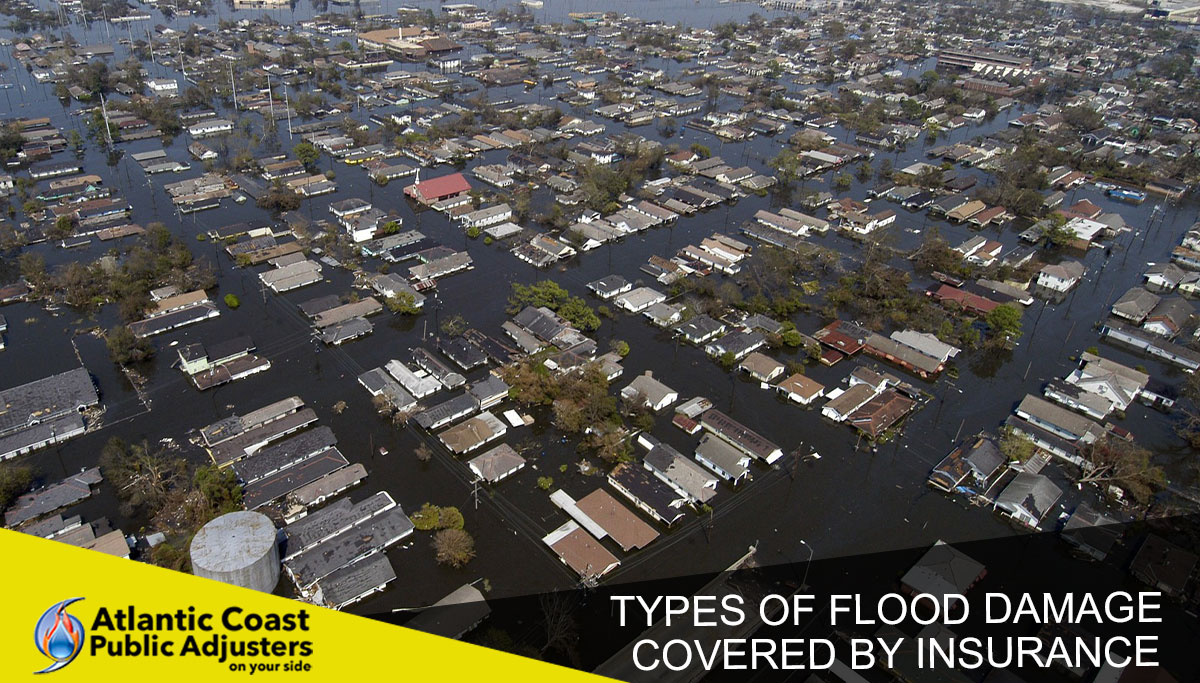Types Of Flood Damage Covered By Insurance

At times, insurance can feel like a grudge investment, but in most cases it is essential. If you’ve ever experienced flood damage that has been covered by insurance, then you’ll understand the value. But how do you know when you’re covered and if you’re getting what you deserve out of insurance?
It’s important to be aware of the conditions that dictate when and how your assets are covered. Flood damage can occur in several instances, and not all are covered by insurance.
Here are a few examples of how flood damage can occur:
- Flash flood – when there’s a fast rise of rapid-moving water
- Coastal flood – occurring during tropical storms, which are not uncommon in Florida
- River floods – when a riverbank, lake, or stream overflow
- Urban floods – occurring when the drainage system in a city is unable to absorb water from heavy rain
- Pluvial floods – when flat areas fail to absorb rainwater, leading to puddles and ponds
- Home flooding – which can occur in a variety of ways including a burst pipe or forgetting to switch off a tap
When you’re educated on what your insurance covers, you’ll be able to get your money that is owed. Even so, you may find that an attorney can be a valuable asset in the claim process.
Contents Covered By Flood Damage
In most cases, insurance covers the structure of the home and most of the contents inside, but not the land. In addition, this cover has its limits.
The home structure description includes the foundation, electricity and plumbing, central air systems and the furnace, water heaters, heating and cooling appliances, and permanent carpeting. The contents that could be covered include clothing, furniture, electronics, portable appliances, and temporary carpeting.
Each insurance policy will outline the contents that are covered. Some will have a limit on the value that will be paid out, for example, valuable artwork may be excluded.
Certain sudden and accidental perils that damage the structure of the home is normally covered by insurance. An example of such a situation includes a pipe bursting that damages a wall.
Flood Damage Not Covered By Most Insurances
Flood damage can occur in a variety of ways. Some may be prevented, while others can occur without warning. Each of these instances is outlined in your insurance policy, so it’s important to read the details of your contract before signing.
For example, leaking plumbing could be covered if the leak is unexpected and accidental. However, poor maintenance can prevent insurance from covering the damage. Here are a few examples of when you won’t be covered by a standard homeowner’s policy.
Damage From Neglected Maintenance Issues
If you neglect to replace or repair plumbing that needs attention and causes a flood, then you may not be covered. For example, if your faucet has been leaking over time and causes damage to your wooden floor, then you may not be covered as the maintenance of the faucet has been neglected.
Source Of Water Damage
While your homeowner policy may cover the repair of damaged flooring or wall, it may not cover the source of the damage. For example, if your dishwasher breaks down and wreaks havoc in the home, then the structural damage may be covered, but the dishwasher itself may not be.
External Source
A traditional homeowner policy may not cover any damage that occurs from an external sewer or drain. Luckily, there is the option to purchase additional sewer or water backup coverage that could contribute to paying for damage from this cause. It may be worth conducting an assessment of the risk.
Natural Flooding
If you want your homeowner’s insurance to cover the flooding that is caused by storms, over-saturated ground, or other natural causes, then you’ll need to ensure that your flood insurance policy is run through the National Flood Insurance Program. If not, then any damage caused by natural flooding may not be covered.
Basement and Expensive Valuables
While flood insurance typically covers the home’s structure and basic contents, it may not cover any belongings in the basement and particularly expensive valuables. In most instances, the personal property in the basement that is covered is limited to washers, dryers, food freezers, and portable air conditioners.
Get The Help Of An Insurance Adjuster
Dealing with insurance claims can get complicated. Often, homeowners are unaware of what their policy covers, and important aspects can slip through the cracks. The team of adjusters from Atlantic Coast Public Adjusters is skilled and experienced in helping with insurance claims to make sure that you get a better insurance settlement or better insurance payout. Contact us at 877-561-2524 for more information.